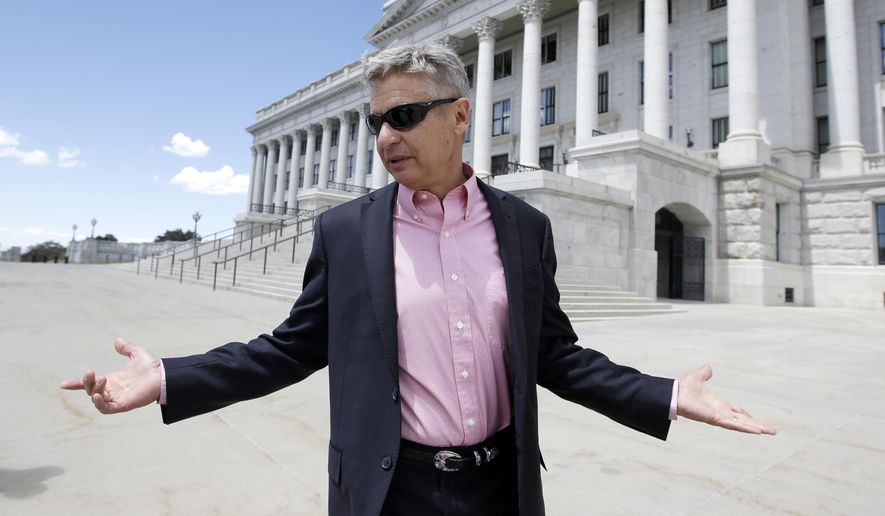It’s not exactly “never Johnson,” but some of Gary Johnson’s former rivals for the Libertarian presidential nomination say they are unimpressed with his campaign and won’t vote for him, with one even channeling Sen. Ted Cruz and telling libertarians to vote their “conscience” as he mounts an informal write-in campaign for himself.
Author Darryl Perry, who placed fourth at the party’s nominating convention in May, said last month that everyone, including libertarians, should “follow their conscience” when voting in the general election.
“I will be writing myself in,” Mr. Perry said this week. “Of the people that are on the ballot in New Hampshire, there’s none of [them] that I think are good.”
Mr. Perry has taken issue with Mr. Johnson’s positions on taxes and guns, among other areas. Mr. Johnson has said he wants to replace the income tax with a consumption tax. He also said he is open to a discussion on banning people on terrorism watch lists from buying guns while criticizing such lists as riddled with errors.
Cybersecurity specialist John McAfee, who came in third, said he is not going to vote. He cited gun control as one reason he is withholding support for Mr. Johnson. He also said he doesn’t see much appeal in either Donald Trump or Hillary Clinton.
“The reason I’m not going to vote is that you cannot tell me that I have a choice between the measles or a bladder infection and expect me to pick one,” Mr. McAfee said.
Mr. Johnson has stumbled in recent weeks on several foreign policy questions. He also failed to qualify for any of the official presidential forums after saying he essentially had no realistic shot to win the White House if he didn’t make it onto the debate stage.
The Johnson campaign said the lack of support from Mr. Perry or Mr. McAfee is “certainly no surprise.”
“Their disagreements with Gov. Johnson on some issues were well known when they sought the LP nomination, and they obviously didn’t prevail with the majority of delegates,” said campaign spokesman Joe Hunter.
Nicholas Sarwark, who chairs the Libertarian National Committee, said people who didn’t win the nomination won’t be happy but that Mr. Johnson was the convention delegates’ clear choice.
“I don’t spend a lot of time thinking about what the haters think,” Mr. Sarwark said. “For the most part, the people who are the loudest concern trolls are the people who do not have our best interests at heart.”
Mr. Johnson does still have the support of businessman Austin Petersen, his top rival for the nomination.
Mr. Petersen acknowledged “disappointments,” such as Mr. Johnson’s blanking on a question about the Syrian city of Aleppo, but said the former two-term New Mexico governor still has a historic opportunity to get a higher vote total than any other Libertarian Party presidential candidate.
“It won’t put him in the White House, but it does advance the movement that’s behind him, which is sort of what I consider the future of politics in the United States, and that’s the liberty movement,” Mr. Petersen said.
As the 2012 Libertarian presidential nominee, Mr. Johnson won about 1 million votes, which translated to about 1 percent of the popular vote. He said this likely will be his final presidential run.
Former Massachusetts Gov. Bill Weld, the party’s vice presidential pick, has also attracted attention in recent weeks for comments suggesting he could spend the final stretch of the campaign attacking Mr. Trump, even though the Libertarian platform is generally seen as closer to the Republicans’ than that of the Democrats.
“He refuses to say anything against Hillary,” Mr. Perry said. “I don’t think Gary has said anything against Hillary [either].”
Some polling has shown that with Mr. Johnson and Green Party candidate Jill Stein in the mix, Mrs. Clinton performs slightly worse against Mr. Trump.
But Mr. Weld’s plan to attack Mr. Trump is consistent with trying to win, Mr. Hunter said.
“Gov. Weld’s views about Donald Trump are neither new nor opaque. He has been clear about them from Day One,” Mr. Hunter said. “And obviously, winning and defeating Trump are not mutually exclusive objectives. In fact, they are quite consistent.”
• David Sherfinski can be reached at dsherfinski@washingtontimes.com.




Please read our comment policy before commenting.